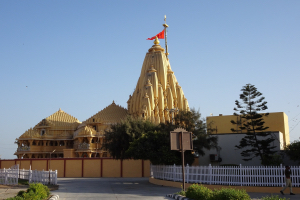
Somnath Temple, Veraval, Gujarat
New Delhi: The Election Commission of India today announced the dates of the Gujarat assembly elections that will be held in two phases.
The first phase of the elections for 89 of the total 182 assembly seats would be held on December 1, 2022. The second phase for the remaining 93 seats would be held on December 5, 2022. The counting of votes will commence on December 8, 2022, the ECI stated.
Following is the detailed schedule of the elections as announced by the ECI:

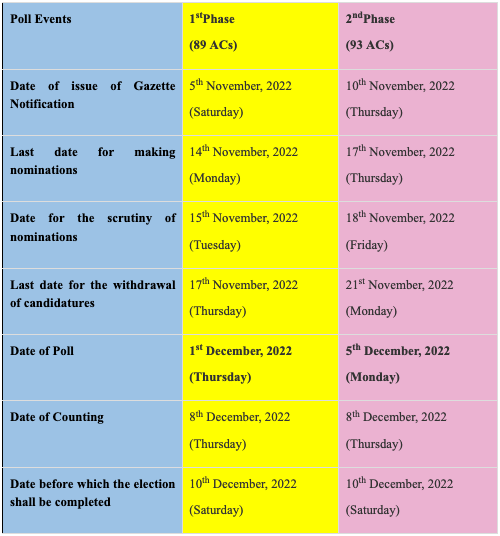
Model Code of Conduct
The Model Code of Conduct (MCC) comes into effect immediately after the announcement of the schedule. All the provisions of the Model Code will apply to the whole of Gujarat with regard to all candidates, political parties and the government of the said State. The Model Code of Conduct shall also be applicable to the Union Government in so far as announcements/policy decisions pertaining to/for Gujarat are concerned.
The Commission stated it has made elaborate arrangements for ensuring the effective implementation of MCC Guidelines. Any violation of these Guidelines would be strictly dealt with and the Commission emphasized that the instructions issued in this regard from time to time should be read and understood by all political parties, contesting candidates and their agents/representatives, to avoid any misgivings or lack of information or inadequate understanding/interpretation. The Governments of the poll-bound States have also been directed to ensure that no misuse of official machinery/position is done during the MCC period.
The Commission also issued instructions for swift, effective and stringent action for enforcement of the Model Code of Conduct during the first 72 hours of the announcement of the election schedule and also for maintaining extra vigilance and strict enforcement action in the last 72 hours prior to the close of polls. These instructions have been issued in the form of Standard Operating Procedures (SOPs) for compliance by the field election machinery.
Silence period
The Commission also called upon all political parties to instruct and brief their leaders and campaigners to ensure that they observe the silence period on all forms of media as envisaged under Section 126 of the RP Act, 1951, and their leaders and cadres do not commit any act that may violate the spirit of Section 126.
In a multi-phased election, the silence period of the last 48 hours may be on in certain constituencies while the campaign is ongoing in other constituencies. In such an event, there should not be any direct or indirect reference amounting to soliciting support for parties or candidates in the constituencies observing the silence period.
During the silence period, star campaigners and other political leaders should refrain from addressing the media by way of press conferences and giving interviews on election matters.
Election expenditure monitoring
Comprehensive instructions for the purpose of effective monitoring of the election expenditure of the candidates have been issued, which include the formation of Flying Squads (FS), Static Surveillance Teams (SST), Video Surveillance Teams (VST), involvement of State Police, Investigation Directorate of Income Tax Department, CBIC, Enforcement Directorate, Financial Intelligence Unit (FIU-IND), DRI, RPF, CISF, BSF, ITBP, ICG, Commercial Tax Department, Narcotics Control Bureau and Department of Post.
The state Excise Department has been asked to monitor the production, distribution, sale and storage of liquor and inducements in the form of free goods during the election process. The functioning and operations of the Flying Squads/Mobile Teams shall be closely monitored using GPS Tracking/and the use of the c-VIGIL App.
For greater transparency and for ease of monitoring of Election Expenses, candidates would be required to open a separate bank account and incur their election expenses from only that account. The Investigation Directorate of Income Tax Department has been asked to activate Air Intelligence Units in the airports of the State and also to gather intelligence and take necessary action to check the movement of large sums of money in Gujarat.
Assured Minimum Facilities (AMF) at Polling Stations
The Commission has issued instructions to the Chief Electoral Officer of Gujarat to ensure that every Polling Station needs to be on the ground floor and, shall have a good access road leading to the polling station building and is equipped with Assured Minimum Facilities (AMF) like drinking water, waiting shed, toilet with water facility, adequate arrangements for lighting, a ramp of a proper gradient for the Persons With Disability (PWD) electors and a standard voting compartment etc. The Commission has directed CEO/DEOs to take efforts to make a permanent ramp and permanent infrastructure at every polling station.
Electoral Rolls
The Commission conducted a Special Summary Revision of Electoral Roll in Gujarat with reference to October 1, 2022, as the qualifying date. Earlier, such revision of roll was conducted with reference to the 1st January of the year. Due to this change, all such young electors who attained the age of 18 years between January 1, 2022, and October 1, 2022 got the chance to enrolment and to use their voting right in this election. After the time-bound completion of the Special Summary Revision of Electoral Rolls with reference to October 1, 2022, as the qualifying date, the final publication of the electoral roll was done on October 10, 2022.
As per the finally published electoral roll, the number of electors in the State of Gujarat is :
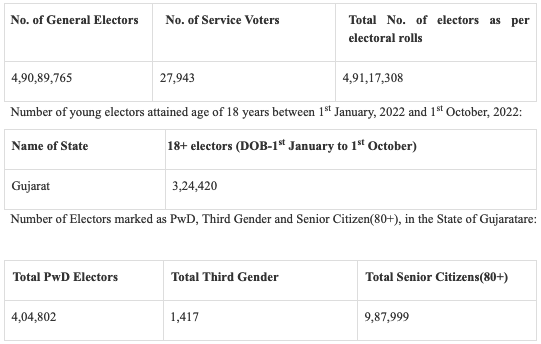
Polling Stations and Special Facilitation
There shall be a maximum of 1500 electors in a polling station. The change in the number of Polling Stations in the State is as follows:

The 2017 Election outcome
In the 14th Gujarat Legislative Assembly election, 2017, the incumbent Bharatiya Janata Party had obtained a simple majority with an increase in the vote share.
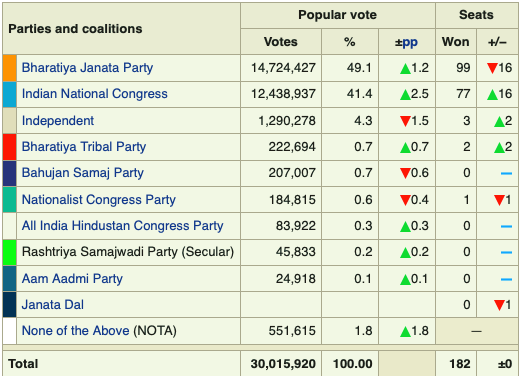
2017 Gujarat Elections: Results by Regions
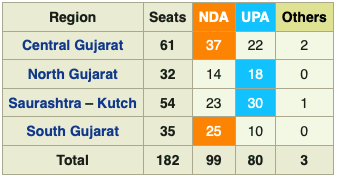
– global bihari bureau




